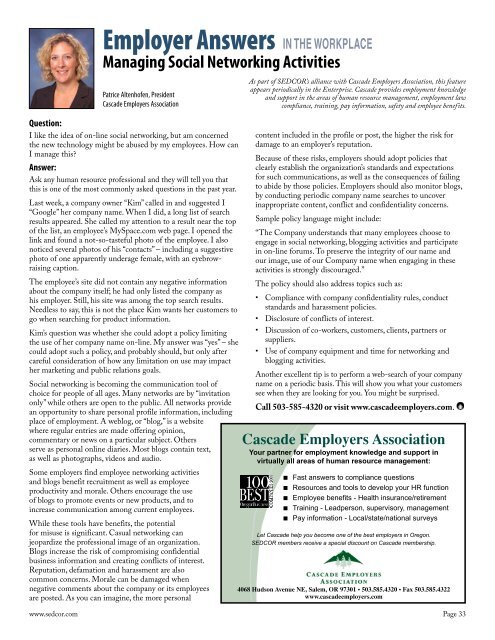Incentives|ResourcesHelp for small business access <strong>to</strong> financing is included in theEconomic Recovery and Investment Act of 2009. TheCongressional proposals had focused on changes in the SmallBusiness Administration loan programs with differences in the Houseand Senate versions. The changes in SBA’s loan and investment programs proposedamong others, reducing bank risk by increasing the SBA guaranty on basic loans<strong>to</strong> 95%; temporarily waiving loan fees <strong>to</strong> make financing more attractive <strong>to</strong> smallbusinesses; increasing some loan size maximums <strong>to</strong> $3 million and allowing SBA <strong>to</strong>make direct loans if SBA lenders in the area would not. The final version containsa package of incentives <strong>to</strong> unlock credit markets. Of the loan program changes atemporary fee reduction and increased guaranty <strong>to</strong> 90% on some SBA loans survived.In a recent survey by the National Small Business Association, nearly 70% of smallbusinesses reported that the credit crunch has impacted their business in some way.The credit environment has tightened and the uncertain economic outlook has madeloans more expensive. According <strong>to</strong> a survey of senior loan officers released by theFederal Reserve, nearly 75% of lenders say they have tightened their credit standardsfor approving commercial and industrial loans <strong>to</strong> small businesses during 2008.Nearly all – 98% - reported that they had increased pricing and had charged morefor loans <strong>to</strong> small businesses.The severity of the current financing climate has not only affected bank lending butalso the volume of loans guaranteed by the Small Business Administration. In 2008SBA loan volume dropped nationwide and the decline has continued in<strong>to</strong> the firstquarter of 2009. During 2008, SBA’s basic guaranteed loans, while <strong>to</strong>taling $12.7billion, declined by 30% in loan volume compared <strong>to</strong> 2007. The drop off for 2009 hasbeen even more dramatic with a 55% decline in volume and a 40% drop in loan dollars.Since its beginning during the New Deal era, the U.S. Small Business Administrationhas had a long his<strong>to</strong>ry of supporting small business start-ups and expansion byassisting banks in providing capital <strong>to</strong> small businesses. Through its relationships withthousands of banks starting in 1953, the SBA has reduced lending risk by offering afederal guaranty <strong>to</strong> banks which will make loans <strong>to</strong> small business when they do not fitthe conventional lending standards, but are nevertheless credit-worthy.Small business can have a big impact on the economy. It is estimated that theyprovide half of all jobs nation-wide. Many people start a small business in response<strong>to</strong> corporate down-sizing and the availability of start-up financing is crucial in theearly stage of the venture. But because of current market conditions, some banks haves<strong>to</strong>pped accepting loan applications for start-up financing from small businesses.Direct: 503-931-2209Cell: 503-510-2582Office: 503-371-3013Fax: 503-364-1453Email: merulli@prurep.comwww.rogerandbonnie.comPage 32Small Business in the Current EconomyROGER MERULLI, Broker, CRS, GRIBONNIE MERULLI, Broker, CRS, GRICall for details onCambridge ViewNew Homes in Salem’s Most Prestigious NeighborhoodRelocating • 1031 ExchangeCertified Residential SpecialistsIt is not only that the uncertain businessclimate makes banks evaluate risk morecarefully. Many are experiencing their owneconomic stress, i.e., increases in their cost offunds and lack in liquidity for lending. Smallcommunity banks appear <strong>to</strong> be less affectedby the credit crunch and continue theirstrong focus on cus<strong>to</strong>mer relationships and atraditional source of funding from depositsnot securitization.In a letter <strong>to</strong> all banks participating in SBAlending, the SBA has asked that banks not callSBA loans au<strong>to</strong>matically when the financialsituation of borrowers deteriorates as a resul<strong>to</strong>f challenging economic conditions.For small businesses, the SBA offers freeonline courses <strong>to</strong> assist them with economicrecovery. The <strong>to</strong>pics include restructuringdebt, diversifying your cus<strong>to</strong>mer base withfederal contracts, revising your business planand winning cus<strong>to</strong>mers in a slowing economy.All courses are self-paced, directed <strong>to</strong> smallbusiness owners and free – www.sba.gov/services/training/onlinecourses.Additional Online Resource InformationMarketing in A Weak Economy: A Dozen Ideashttp://www.score.org/m_pr_12.htmlSmall Businesses Face Economic Cycles withConfidencehttp://www.sba.gov/idc/groups/public/documents/ri_providence/ri_small_biz_confidence.pdfCompetitive Intelligence On A Shoestringhttp://www.entrepreneur.com/startingabusiness/findingcus<strong>to</strong>mers/marketresearch/article79512.htmlInga Fisher Williams is the Small BusinessAdministration’s regional export financemanager at the U. S. Export AssistanceCenter in Portland, OR. She covers Idaho,Montana, Oregon and SW Washing<strong>to</strong>n andcan be reached at 503-326-5498, or inga.fisherwilliams@sba.gov.USDA RuralDevelopment hasNew Energy PortalIncreasingly energy efficiency and renewableenergy are common features of ruralenergy projects. Nearly all of USDA RuralDevelopment’s program can support suchactivities, but new programs are particularlywell-suited for rural energy project. EnergyEfficiency, Renewable Energy programs,Farm Bill Changes, and additional links andresources are available on their website. Visitwww.rurdev.usda.gov/or/energy.htm.<strong>SEDCOR</strong> Enterprise Magazine
Employer AnswersManaging Social Networking Activitieswww.sedcor.comPatrice Altenhofen, PresidentCascade Employers AssociationQuestion:I like the idea of on-line social networking, but am concernedthe new technology might be abused by my employees. How canI manage this?Answer:Ask any human resource professional and they will tell you thatthis is one of the most commonly asked questions in the past year.Last week, a company owner “Kim” called in and suggested I“Google” her company name. When I did, a long list of searchresults appeared. She called my attention <strong>to</strong> a result near the <strong>to</strong>pof the list, an employee’s MySpace.com web page. I opened thelink and found a not-so-tasteful pho<strong>to</strong> of the employee. I alsonoticed several pho<strong>to</strong>s of his “contacts” – including a suggestivepho<strong>to</strong> of one apparently underage female, with an eyebrowraisingcaption.The employee’s site did not contain any negative informationabout the company itself; he had only listed the company ashis employer. Still, his site was among the <strong>to</strong>p search results.Needless <strong>to</strong> say, this is not the place Kim wants her cus<strong>to</strong>mers <strong>to</strong>go when searching for product information.Kim’s question was whether she could adopt a policy limitingthe use of her company name on-line. My answer was “yes” – shecould adopt such a policy, and probably should, but only aftercareful consideration of how any limitation on use may impacther marketing and public relations goals.Social networking is becoming the communication <strong>to</strong>ol ofchoice for people of all ages. Many networks are by “invitationonly” while others are open <strong>to</strong> the public. All networks providean opportunity <strong>to</strong> share personal profile information, includingplace of employment. A weblog, or “blog,” is a websitewhere regular entries are made offering opinion,commentary or news on a particular subject. Othersserve as personal online diaries. Most blogs contain text,as well as pho<strong>to</strong>graphs, videos and audio.Some employers find employee networking activitiesand blogs benefit recruitment as well as employeeproductivity and morale. Others encourage the useof blogs <strong>to</strong> promote events or new products, and <strong>to</strong>increase communication among current employees.While these <strong>to</strong>ols have benefits, the potentialfor misuse is significant. Casual networking canjeopardize the professional image of an organization.Blogs increase the risk of compromising confidentialbusiness information and creating conflicts of interest.Reputation, defamation and harassment are alsocommon concerns. Morale can be damaged whennegative comments about the company or its employeesare posted. As you can imagine, the more personalAs part of <strong>SEDCOR</strong>’s alliance with Cascade Employers Association, this featureappears periodically in the Enterprise. Cascade provides employment knowledgeand support in the areas of human resource management, employment lawcompliance, training, pay information, safety and employee benefits.content included in the profile or post, the higher the risk fordamage <strong>to</strong> an employer’s reputation.Because of these risks, employers should adopt policies thatclearly establish the organization’s standards and expectationsfor such communications, as well as the consequences of failing<strong>to</strong> abide by those policies. Employers should also moni<strong>to</strong>r blogs,by conducting periodic company name searches <strong>to</strong> uncoverinappropriate content, conflict and confidentiality concerns.Sample policy language might include:“The Company understands that many employees choose <strong>to</strong>engage in social networking, blogging activities and participatein on-line forums. To preserve the integrity of our name andour image, use of our Company name when engaging in theseactivities is strongly discouraged.”The policy should also address <strong>to</strong>pics such as:• Compliance with company confidentiality rules, conductstandards and harassment policies.• Disclosure of conflicts of interest.• Discussion of co-workers, cus<strong>to</strong>mers, clients, partners orsuppliers.• Use of company equipment and time for networking andblogging activities.Another excellent tip is <strong>to</strong> perform a web-search of your companyname on a periodic basis. This will show you what your cus<strong>to</strong>merssee when they are looking for you. You might be surprised.Call 503-585-4320 or visit www.cascadeemployers.com.Page 33



